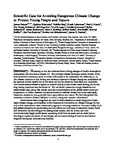Scientific Case for Avoiding Dangerous Climate Change to Protect Young People and Nature
| dc.contributor.author | Hansen, J | en |
| dc.contributor.author | Kharecha, P | en |
| dc.contributor.author | Sato, M | en |
| dc.contributor.author | Ackerman, F | en |
| dc.contributor.author | Hearty, PJ | en |
| dc.contributor.author | Hoegh-Guldberg, O | en |
| dc.contributor.author | Hsu, S-L | en |
| dc.contributor.author | Krueger, F | en |
| dc.contributor.author | Parmesan, C | en |
| dc.contributor.author | Rahmstorf, S | en |
| dc.contributor.author | Rockstrom, J | en |
| dc.contributor.author | Rohling, EJ | en |
| dc.contributor.author | Sachs, J | en |
| dc.contributor.author | Smith, P | en |
| dc.contributor.author | Steffen, K | en |
| dc.contributor.author | Susteren, LV | en |
| dc.contributor.author | Schuckmann, KV | en |
| dc.contributor.author | Zachos, JC | en |
| dc.date.accessioned | 2017-05-22T15:22:07Z | |
| dc.date.available | 2017-05-22T15:22:07Z | |
| dc.date.issued | 2012-03-23 | en |
| dc.identifier.uri | http://hdl.handle.net/10026.1/9304 | |
| dc.description | 28 pages, 6 figures; version submitted to Proceedings of the National Academy of Sciences | en |
| dc.description.abstract |
Global warming due to human-made gases, mainly CO2, is already 0.8{\deg}C and deleterious climate impacts are growing worldwide. More warming is 'in the pipeline' because Earth is out of energy balance, with absorbed solar energy exceeding planetary heat radiation. Maintaining a climate that resembles the Holocene, the world of stable shorelines in which civilization developed, requires rapidly reducing fossil fuel CO2 emissions. Such a scenario is economically sensible and has multiple benefits for humanity and other species. Yet fossil fuel extraction is expanding, including highly carbon-intensive sources that can push the climate system beyond tipping points such that amplifying feedbacks drive further climate change that is practically out of humanity's control. This situation raises profound moral issues as young people, future generations, and nature, with no possibility of protecting their future well-being, will bear the principal consequences of actions and inactions of today's adults. | en |
| dc.language.iso | en | en |
| dc.subject | physics.ao-ph | en |
| dc.subject | physics.ao-ph | en |
| dc.title | Scientific Case for Avoiding Dangerous Climate Change to Protect Young People and Nature | en |
| dc.type | Journal Article | |
| plymouth.author-url | http://arxiv.org/abs/1110.1365v3 | en |
| plymouth.journal | arXiv:1110.1365 [physics.ao-ph] (or arXiv:1110.1365v3 [physics.ao-ph] for this version) | en |
| plymouth.organisational-group | /Plymouth | |
| plymouth.organisational-group | /Plymouth/Faculty of Science and Engineering | |
| plymouth.organisational-group | /Plymouth/Faculty of Science and Engineering/School of Biological and Marine Sciences | |
| plymouth.organisational-group | /Plymouth/REF 2021 Researchers by UoA | |
| plymouth.organisational-group | /Plymouth/REF 2021 Researchers by UoA/UoA07 Earth Systems and Environmental Sciences | |
| dcterms.dateAccepted | 2011-10-06 | en |
| dc.rights.embargoperiod | No embargo | en |
| rioxxterms.licenseref.uri | http://www.rioxx.net/licenses/all-rights-reserved | en |
| rioxxterms.licenseref.startdate | 2012-03-23 | en |
| rioxxterms.type | Journal Article/Review | en |


